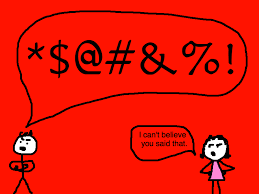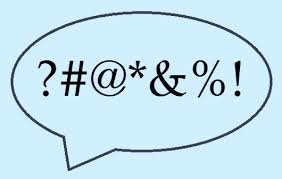
Do those words in the title inspire you to rip off your clothes and get naked with your significant other?
More and more often I find the F-word creeping into romance novels. I first noticed the word being used by bad guys in romantic suspense books probably about ten years ago. Though I didn’t really like it, I could see it being used by criminals. Then it started appearing in moments of high emotion or stress that a hero or heroine was experiencing. I put aside those books. And now the word has infiltrated every-day dialogue between characters, especially between the hero and heroine!
Society today does not look at profanity the way it did twenty years ago. Epithets (I’ve always wanted to use that word!) are common in conversation, in texting, in music, and even in advertising (a hotel search web site uses its name in place of the F-word in its slogan). And now authors are catching the wave and adding the F-bomb to their romance novels in the hopes of being “cool” or “hip,” or “trendy.” But what does the word really add to a romance?
Some might say “reality.” Literature mirrors the norm of a society, it’s true. But I think most romance readers are looking to be transported from their reality. Why else would they be reading books about perfect lovers who are always ready to perform, who have washboard abs, and want to cuddle and talk after sex? Romance novels are escapism at its best.
Does using the F-word in bedroom scenes make a reader all hot and bothered? Depends on the reader. But I’m going to go out on a limb here and guess that a majority of romance readers want a bit more romantic description in their books. I think they’d love to read how much the hero has been wanting the heroine, how much he’s been thinking about her, and what her looks do to him. Women like to be wooed, even in this day and age, even in books. And I’m not sure “Let’s f#!* qualifies as wooing. I’d love to ask men how much action they get if they tell women “I wanna f#!* you.”
And then there’s the usage of the F-bomb as an adjective. A character might say “It was (effing) miserable at the party.” And his friend might reply, “Then why the (eff) did you go?” We’re back to the reality reason for using the F-word in a romance novel. I’m sure we’ve all heard the sorts of phrases I’ve just written above, so they qualify as reality. But, does that type of language transport a reader from her real life of laundry, carpools, dirty dishes and pet accidents? Again, it’s up to the individual reader.
Besides, if an author really wants to use swearing, which I do as well for characterization, the more acceptable “damn” and “hell” fit in the sentences above just as easily. There is no real stand-out reason to use the F-bomb in place of more generic curses.
Romance novels take their readers out of their daily lives and deliver them to exotic locales with beautiful characters and plots that often strain reality. They’ve been doing it for years and years. Remember the Barbara Cartland romance novel (if you’re too young, google her)?
Nowadays we writers strive to be more realistic, but truly, how many of our readers are going to go to the Amazon in search of a missing family member? How many of them are going to meet a prince that is masquerading as a regular guy? These plots aren’t realistic, but those books leap off the shelves. Readers love escapism in romance.
So why should we douse our readers with reality in the form of the F-word?

 RSS Feed
RSS Feed
